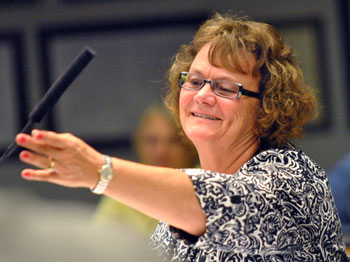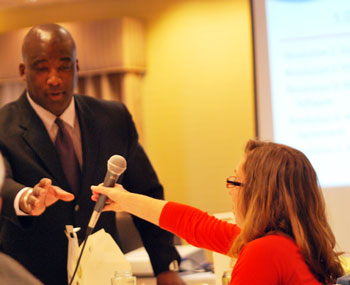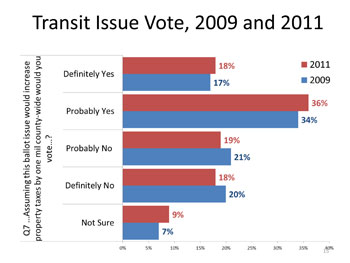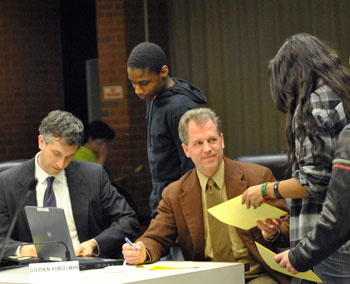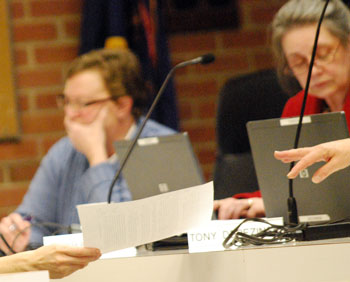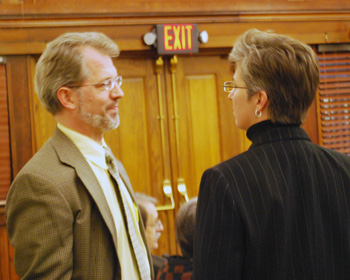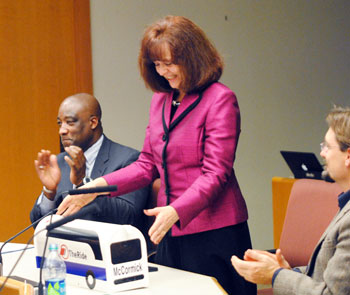At its Jan. 23, 2012 meeting, the Ann Arbor city council again delayed action on a four-party agreement that would establish a framework for a transition of the Ann Arbor Transportation Authority to a countywide governance incorporated under Michigan’s Act 196 of 1986.
The council postponed action until its Feb. 6 meeting, but not before undertaking several amendments to the text of the agreement. The council had previously postponed action at its Jan. 9 meeting and had set a public hearing for Jan. 23. A few dozen people appeared before the council to speak during the hearing.
The four-party agreement – between the Ann Arbor Transportation Authority, the city of Ann Arbor, the city of Ypsilanti and Washtenaw County – would establish a framework for making a transition of the AATA to a countywide system of governance under Michigan’s Act 196 of 1986.
The transition to a countywide governance and funding base is intended to (1) ensure stability of funding for transit connections outside of the city of Ann Arbor, which until now has depended on purchase-of-service agreements; (2) provide a higher level of transit service inside the city of Ann Arbor; and (3) expand the area where transit service is provided.
In the four party-agreement, the role of the two cities – Ann Arbor and Ypsilanti – would be to pledge their current transit millages to the new authority, contingent on identifying a countywide funding source. The two cities currently levy millages that are designated for public transit and are passed through to the AATA. For Ann Arbor, that’s currently just over 2 mills. For Ypsilanti, which uses the proceeds of the tax – approved in November 2010 – to fund its purchase-of-service agreement with the AATA, the levy is just under 1 mill. [One mill is $1 for each $1,000 of a property's taxable value.]
As part of the four-party agreement, Ypsilanti and Ann Arbor would agree that AATA’s existing assets would be assumed by the new Act 196 transit authority, and they’d also agree to assign their existing millages to the new Act 196 authority. But the asset transfer and the millage assignment would be contingent on identifying a countywide funding source for the new Act 196 authority.
Although the council postponed action, it did undertake several amendments to the accord.
Completely struck was a section that contemplated the possibility that “funding sources are elected to fund the NEW TA [transit authority] which do not require voter approval.” A new addition was the explicit requirement that the city councils of Ann Arbor and Ypsilanti would need to vote to adopt the articles of incorporation that Washtenaw County would file to formally incorporate the new Act 196 transit authority. [.pdf of draft articles of incorporation]
A phrase was inserted in two spots (one for each of the cities) to place on the new Act 196 transit authority a requirement to the effect that the new authority must provide to Ann Arbor and Ypsilanti “at a minimum, the continued level of services provided by its predecessor-in-interest, AATA, …”
Another revision highlighted at the beginning of some relevant paragraphs the condition that must be met in order for the substance of the paragraph to apply, and expresses it in terms of time, not abstract logic: “After all of the Section 8 contingencies to Closing are satisfied, …”
Another revision accommodated the possibility that some municipalities might choose to opt out of an Act 196 authority if one were to be incorporated – by swapping in “authority-wide” for the phrase “county-wide.” Those amendments undertaken by the council are reflected in the marked up document: [.pdf of marked up four-party agreement]
An additional revision approved by the council stipulates that if Ann Arbor is the only municipality in the county that opts in to the Act 196 authority, then the agreement is null and void.
Stephen Kunselman (Ward 3) indicated that at the council’s next meeting, he’d bring forward a possible amendment to change the composition of the board of the new transit authority that’s described in the four-party agreement, so that Ann Arbor has a majority. The original version, which remains in place, calls for a 15-member board to which Ann Arbor would appoint seven members. Ypsilanti would have one seat, and a district that includes Ypsilanti and August townships would have two seats (the southeast district). Pittsfield Township would constitute a district. The other four seats would come from districts labeled as follows: west, north central, northeast, south central. [.jpg of map showing board composition of Act 196 transit authority]
This brief was filed from the city council’s chambers on the second floor of city hall located, at 301 E. Huron. A more detailed report will follow: [link] [Full Story]




